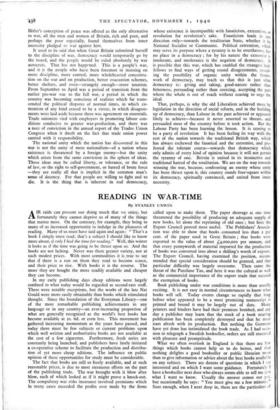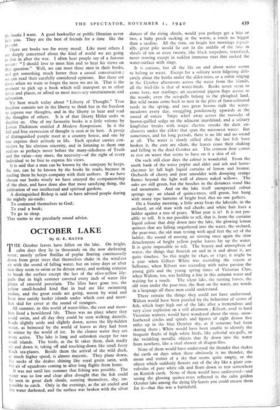READING IN WAR-TIME
By STANLEY UNWIN
A IR raids can prevent our doing much that we enjoy, but
A
fortunately they cannot deprive us of many of the things that matter most. On the contrary, for example, they bring to many of us increased opportunity to indulge in the pleasures of reading. Many of us must have said again and again : " That's a book I simply must read; that's a subject I should like to know more about, if only I had the time for reading." Well, this winter it looks as if the time was going to be thrust upon us. And the books are not lacking. Never was there greater variety, nor at such modest prices. With most commodities it is .true to say that if there is a run on them they tend to become scarce, and their price to rise. With books it is the reverse. The more they are bought the more readily available and cheaper they can become.
In my early publishing days cheap editions were largely confined to what today would be regarded as second-rate stuff. There were notable exceptions, but the works of the late Nat Gould were more easily obtainable than books which stimulated thought. Since the foundation of the Everyman Library—one of the most remarkable publishing achievements in any language or in any country—an ever-increasing proportion of what are generally recognised as the world's best books has become available at 25. 6d. or even less. This movement has gathered increasing momentum as the years have passed, and today there must be few subjects or current problems upon which well written and authoritative books are not available at the cost of a few cigarettes. Furthermore, fresh series are constantly being launched, and publishers' have lately initiated a co-operative scheme to facilitate the production and distribu- tion of yet more cheap editions. The influence on public opinion of these opportunities for study must be considerable.
The fact that books are still so freely available, and at such reasonable prices, is due to most strenuous efforts on the part of the publishing trade. The war brought with it blow after blow, each of which looked as if it might prove a knock-out. The compulsory war risks insurance involved premiums which in many cases exceeded the profits ever made by the firms called upon to make them. The paper shortage at one time threatened the possibility of producing an adequate supply of new books, let alone the reprinting of old ones ; but here the Export Council proved most useful. The Publishers' Associa- tion was able to show that books consumed less than 2 per cent. of the paper used in Great Britain ; that books were exported to the value of about £4,000,000 per annum, and that every pennyworth of material imported for the production of books was converted into about a shilling's worth of exports. The Export Council, having examined the position, recom- mended that special consideration should be granted, and that particular difficulty was largely overcome. Then came the threat of the Purchase Tax, and here it was the cultural as well as the commercial importance of the export trade that secured the exemption of books.
Book publishing under war conditions is more than usually exciting. It is not easy in normal circumstances to know what books will sell. Today events change so rapidly that long before what appeared to be a most promising manuscript is printed and bound it may be largely out of date. Many printers and binders have had their premises bombed, and any day a publisher may learn that the stock of a book nearing publication has been completely destroyed and that he must start afresh with its production. But nothing the Germans have yet done has intimidated the book trade. As I had occa- sion to telegraph a Swedish bookseller, orders are still executed with pleasure and promptitude.
What we often overlook in England is that there are few things which books cannot help us to do better, and that nothing delights a good bookseller or public librarian more than to give information or advice about the best books available on any subject. There are dozens of questions in which I am interested and on which I want some guidance. Fortunately I have a bookseller next door who always seems able to tell me just what I want to know. Usually the answer comes out pat, but occasionally he says: " You must give me a few minutes." Sure 'enough, when I next drop in, there are the particulars of the books I want. A good bookseller or public librarian never fails you. They are the best of friends for a time like the present. There are books too for every mood. Like most others I am deeply concerned about the kind of world we are going to live in after the war. I often hear people say of a famous writer: "I should love to meet him and to hear his views on that question." Well, we can meet these men in their books, and get something much better than a casual conversation ; we can read their carefully considered opinions. But there are times when we want to forget the mess we are in. That is the moment to pick up a book which will transport us to other times and places, or afford us most necr r entertainment and relaxation.
We hear much today about " Liberty of Thought." True freedom consists not in the liberty to think but in the freedom to express our thoughts, and in the liberty to hear and read the thoughts of others. It is of that liberty Hitler seeks to deprive us. One of my favourite books is a little volume by Lowes Dickinson entitled A Modern Symposium. In it the full and free expression of thought is seen at its best. A group of distinguished people meet at a country house, and one by one express their attitude to life. Each speaker carries con- viction by his obvious sincerity, and in listening to them one realises as perhaps never before the many-sidedness of Truth and the value—nay more, the necessity—of the right of every individual to be free to express his views.
It is said that a man can be known by the company he keeps. So, too, can he be known by the books he reads, because in reading them he keeps company with their authors. If we have chosen our books wisely we have enjoyed the companionship of the elect, and have done also that most satisfying thing, the cultivation of our intellectual and spiritual gardens.
A distinguished Bishop is said to have advised people during the nightly air-raids: To commend themselves to God; To read a book; To go to sleep.
That seems to me peculiarly sound advice.







































 Previous page
Previous page